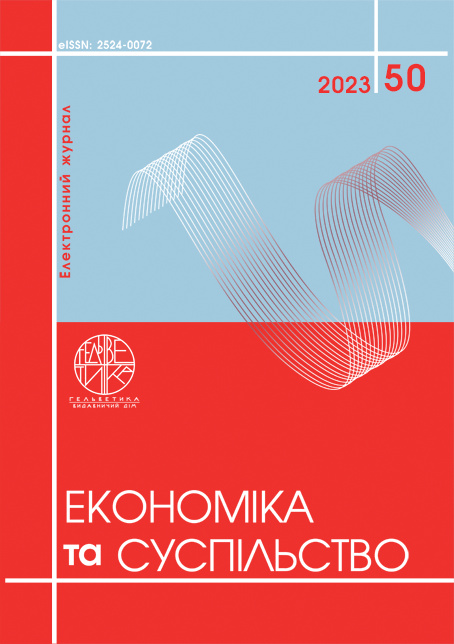CLASSIFICATION OF NEEDS IN THE CONTEXT OF BEHAVIORAL ECONOMICS
Abstract
The study is devoted to the problem of classification of needs in the context of behavioral economics. The article examines the existing classifications and the expediency of their use for the analysis of social phenomena. The main goal of the research is to create a generalized classification of needs for practical application in the analysis of behavioral processes. The proposed classification includes useful and previously incompatible elements of individual theoretical works. A new approach is proposed, which has absorbed the positive qualities of existing concepts and expands their boundaries. An extended classification of needs for practical application in the analysis of behavioral processes is proposed. This classification includes useful and previously incompatible elements of separate theoretical works, such as an expanded list of needs, the addition of factors that are motivating for human behavior, and destructive needs. What is new in the approach is the division of needs into three types depending on the level of their necessity for life, namely: necessary for survival, generally desired and specific needs. Thus, the new classification takes into account and extends existing approaches and can be useful for descriptive analysis in the context of behavioral economics. The results of the research are relevant in the context of modern economic science, as understanding needs and their classification can be useful for solving socio-economic problems. The practical application of the new classification can help in the development of effective management and marketing strategies, as well as in the analysis of the behavior and motivation of the subjects of choice, such as product consumers, investors, etc.
References
A. H. Maslow (1943). A Theory of Human Motivation. Psychological Review. № 50. Р. 370–396.
D. C. McClelland (1976). The achieving society. New York, Irvington publishers, 530 р.
M. Todd Royle, Angela T. Hall (2012). The relationship between McClelland’s theory of needs, feeling individually accountable, and informal accountability for others. International journal of management and marketing research, vol. 5, num. 1, р. 21–42.
Yarochenko Y. (2019). Philosophical approach to the classification of needs of a human being in 21st century. Riga, Latvia, April 6, р. 8–11.
I. T. Ondabu (2014). A Theory of Human Motivation: The Tirimba Grouping Theory of Motivation. SOP Transactions on economic research, Volume 1, Number 1, January, р. 16–21.
H. T. Uysal, S. Aydemir, E. Genç (2017). Maslow’s hierarchy of needs in 21st century: the examination of vocational differences, р. 211–227.
S. K. Tan (2013). Herzberg's Two-Factor Theory on Work Motivation: Does it Works for Todays Environment? G.J.C.M.P., vol. 2(5), pp. 18–22.
Butenko D. S. (2020). Theories of motivation: practical aspect. Effective economy. No. 5. Available at: http://www.economy.nayka.com.ua/?n=5&y=2020
Protasenko O. F., Potemkina M. O. (2021). The role of the ecological needs of the citizen in the development of ecological security / Ecological security – modern directions and prospects of higher education: materials of the 1st international. Internet conference, February 25, 2021: theses add. Kharkiv: Kharkiv National University named after V. N. Karazina. P. 114–116.
А. Х. Маслоу. Теорія мотивації людини. Психологічний огляд. 1943. № 50. С. 370–396.
Д. К. Макклелланд. Суспільство, що досягло успіху. Нью-Йорк, видавництво Ірвінгтон, 1976. 530 с.
М. Тодд Ройл, Анжела Т. Холл. Взаємозв'язок між теорією потреб Макклелланда, почуттям індивідуальної відповідальності та неформальною відповідальністю за інших. Міжнародний журнал менеджменту та маркетингових досліджень. 2012. Том 5, № 1. С. 21–42.
Яроченко Ю. Філософський підхід до класифікації потреб людини у 21 столітті. Рига, Латвія, 6 квітня 2019 р. С. 8–11.
І. Т. Ондабу. Теорія мотивації людини: теорія мотивації групування Тірімба. Транзакції СОП з економічних досліджень. Том 1, № 1, січень 2014. С. 16–21.
Х. Т. Уйсал, С. Айдемір, Е. Генч. Ієрархія потреб Маслоу в 21ст.: вивчення професійних відмінностей. 2017. С. 211–227.
С. К. Тан. Двофакторна теорія мотивації праці Герцберга: чи працює вона для сучасних умов? G.J.C.M.P. 2013. Том 2(5). С. 18–22.
Бутенко Д. С. Теорії мотивації: практичний аспект. Ефективна економіка. 2020. № 5. URL: http://www.economy.nayka.com.ua/?n=5&y=2020
Протасенко О. Ф., Потьомкіна М. О. Роль екологічних потреб працівника у розвитку екологічної безпеки / Екологічна безпека – сучасні напрямки та перспективи вищої освіти : матеріали I міжнар. інтернет-конф., 25 лютого 2021 р. : тези допов. Харків : Харківський національний університет ім. В. Н. Каразіна, 2021. С. 114–116.

This work is licensed under a Creative Commons Attribution 4.0 International License.


